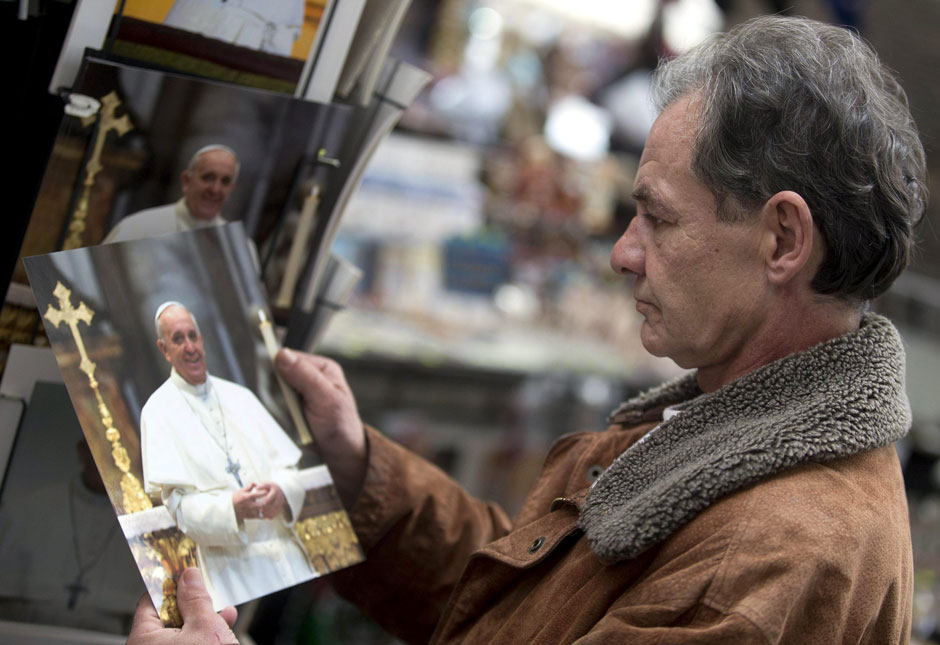At a recent I talk I gave about Pope Francis, a man asked me, “Why do more non-Catholics like the pope than Catholics do?” He was wrong, of course. A Pew poll two months ago found that 90 percent of Catholics like what the pope is doing—and the number is even higher (95 percent) among the most observant, Mass attending Catholics. The percentage of non-Catholics who view the pope favorably does not get above the 70s.
Yet the question was understandable. There is a perception of great resistance to the pope in his own church. This is largely the product of noise. Extremists get more press coverage than blander types, and some Catholic bloggers have suggested that the pope is not truly Catholic. They are right to be in a panic. They are not used to having a pope who is a Christian. They call Francis a radical because he deplores the sequestration of great wealth for a rich few and deprivation of the many poor. But Francis is a moderate. Jesus was the radical: “How hard it will be for the wealthy man to enter the kingdom of God…. It is easier for a camel to pass through the eye of a needle than for the rich man to enter the kingdom of God.” (Mark 10:23, 26). In the Gospel of Luke (16:19-31), when the rich man (Dives) calls for succor from hell, Abraham, holding the poor man (Lazarus) in his bosom, answers: “All the good things fell to you while you were alive, and all the bad to Lazarus; now he has his consolation here, and it is you who are in agony.”
Some right-wing Catholics would haul Dives up and enshrine him in the 1 percent of rich men who trickle wealth down on the rest of us. They are also descendants of those Pharisees who tried to keep people away from Jesus because “This fellow welcomes sinners and eats with them” (Luke 15:1-2). The modern Pharisees try to refuse the Eucharist to politicians who do not meet their doctrinal tests. Pope Francis’s response to this patrolling of the communion line is in his major statement so far, The Joy of the Gospel (No. 47):
The Eucharist, although it is the fullness of sacramental life, is not a prize for the perfect, but a powerful medicine and nourishment for the weak.
Which position would Jesus agree with? We find the answer in the Gospel of Mark (1:17), where Jesus says:
It is not the healthy that need a doctor, but the sick; I did not come to invite virtuous people, but sinners.
Pope Francis describes the church as a ministry to wounded people:
I see the church as a field hospital after battle. It is useless to ask a seriously injured person if he has high cholesterol and about the level of his blood sugars. You have to heal the wounds. Then we can talk about everything else. Heal the wounds.
Some “traditional” Catholics also see the church as a battlefield; but they go out after battle to shoot the wounded. They are typified by hierarchs like Cardinal Raymond Burke, who says Catholics who remarry outside the church are like murderers, living defiantly in public sin. Or like Archbishop Salvatore Cordileone, who issued a guide for teachers in the Catholic schools of San Francisco, requiring them to oppose—in the classroom and in their private lives—abortion, contraception, artificial insemination, same sex marriage, adultery, fornication, masturbation, and pornography. He also installed a water system in the overhang at Saint Mary’s Cathedral to soak homeless people who were trying to sleep there. Every hour or half hour, for 75 seconds, the pipes would gush down on those below and flush them away like human refuse.
Contrast that with the reaction of Pope Francis when he found that homeless people were sleeping at the entrance to the Vatican piazza. He sent bedrolls out to them, set up showers for them to use in the morning, and sent four hundred more bed rolls to be distributed to the homeless around Rome. The difference between flushing people away and comforting them recalls one of the pope’s favorite parables, that of the Good Samaritan (Luke 10:25-37). A man wounded almost to death lies by the road. A Temple priest and a member of the priestly (Levite) tribe pass him by so as not to be polluted by a corpse. But a Samaritan (whom Jews thought of as an outcast) rescued the man and paid for his healing. The pope also loves the story of the prodigal son, who wastes his patrimony but is welcomed back by his father, though the prodigal’s elder brother resents this treatment of a sinner.
Advertisement
Perhaps it is wrong to think of a “Catholic right” and a “Catholic left.” It may be more fitting to think of the former as the defenders of Dives, or the Pharisees who do not want people to eat with Jesus, or the flushers of the homeless, or the priestly Levites, or the prodigal’s elder brother—while their opposites are the lovers of Lazarus, or the sinners who eat with Jesus, or the bedroll people, or the “outcast” Samaritan, or the prodigal’s father. These are the two forms of Christianity now on offer. Let Catholics make their choice.



